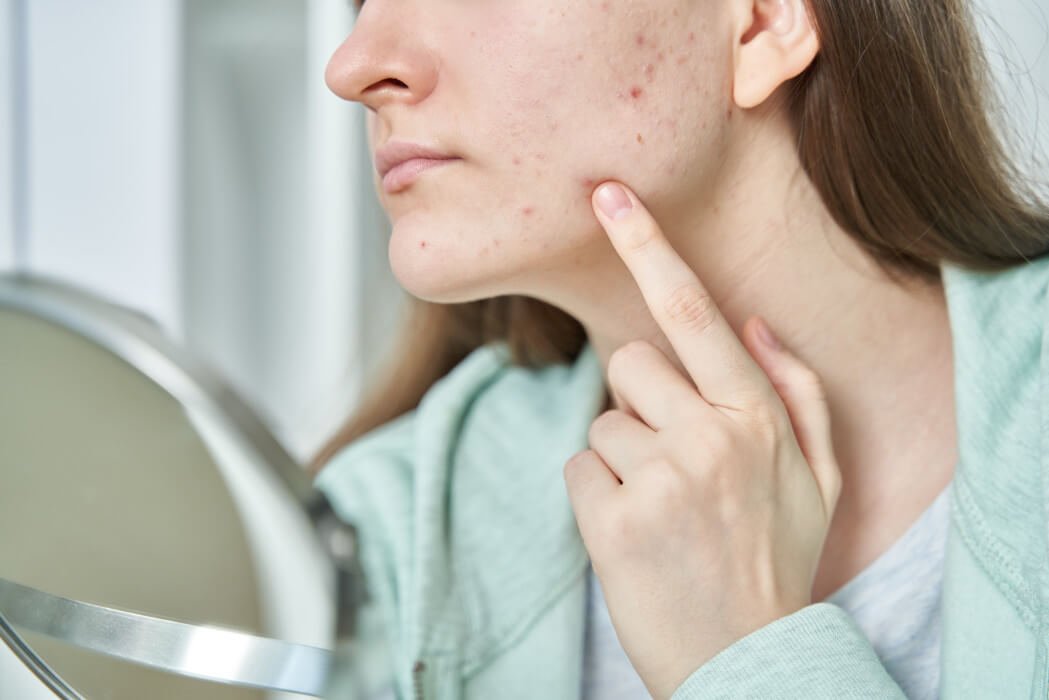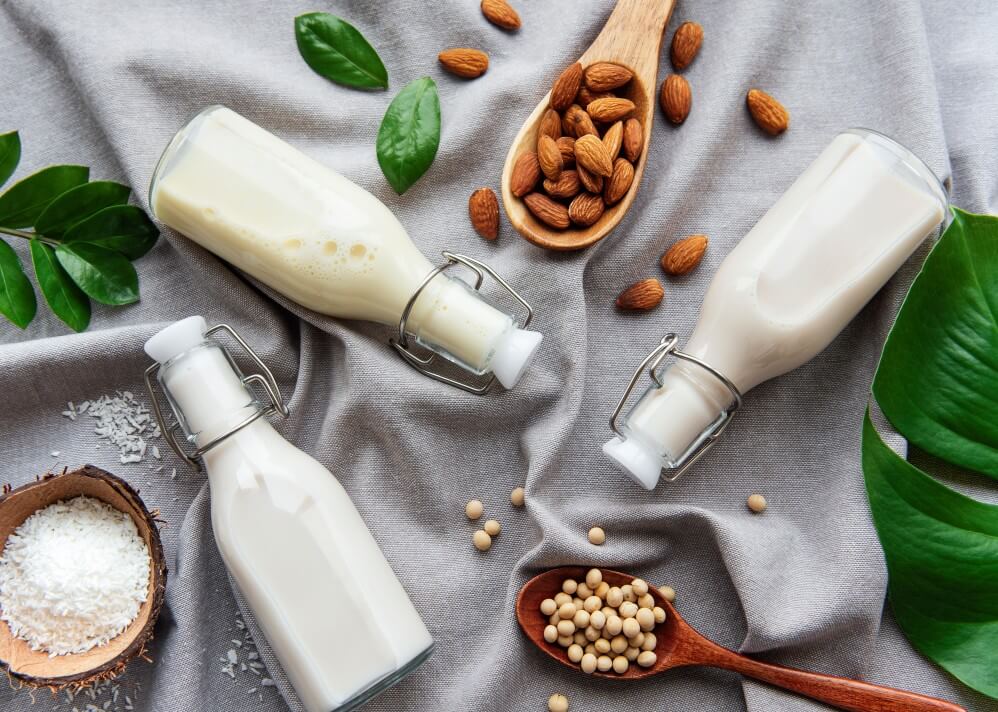Acne is not just an annoying skin breakout - it causes scars that can lurk on your skin for a lifetime and damage your confidence.
So it’s no surprise that we want to avoid any foods that spark an acne breakout. While each person is different, almonds are one of the foods that people say can cause acne. This is thanks to the hormones naturally present in almond nuts.
Continue reading to discover the truth behind the gossip and how almond milk can contribute to acne breakouts.
Can Almond Milk Cause Acne?
When it comes to acne, doctors and researchers cite dairy, gluten, soy, and nuts among the top contributors to this skin condition.
Many people accept that dairy and gluten cause breakouts, but nuts - particularly almonds - are more difficult to believe.
We often hear about the positive qualities of nuts, such as their nutrient and antioxidant content, their impact on lowering cholesterol, and their contribution to good heart health.
For these reasons, most of us associate nuts as a portion of “good” food.
If you're trying to find the trigger for an acne breakout, almonds may be at the bottom of your list, but they could be the culprit of your skin problems.

Why Does Almond Milk Cause Acne?
The primary reason why some people believe that almond milk exacerbates acne is the impact of nuts on the skin.
Nuts, particularly almonds, can contain high amounts of estrogen, which can aggravate spots.
If a hormonal balance is responsible for your acne breakouts, then you may want to avoid a further imbalance from nuts.
However, here we refer to nuts as a natural product, not nutty milk substitutes. So what about almond milk? Does that possess the same estrogen levels?
In general, almond milk doesn’t contain many actual almonds, hence why their fat content is lower.
This means that the hormone level in almond milk is low in comparison to the nuts themselves or when compared to cow milk.
Thanks to its lower hormone levels and reduced sugar and dairy content, almond milk can be a much better substitute than cow’s milk.
But, you may still consume compounds in almond milk that will increase your estrogen levels.
For this reason, there is every chance that almond milk could cause acne.

Is Almond Milk Bad For Acne?
Almond milk is a popular alternative to the dairy variety for vegans and lactose-intolerant people.
Regular cow milk contains a mix of hormones that our bodies are not equipped to deal with, so it is no surprise that this beverage can cause an acne breakout.
What may surprise some people is that almond milk can also exacerbate acne.
It may not possess the fat or hormonal mix of cow milk, but it comes with its own unique composition that can trigger a breakout.
Sometimes, people think that dairy is responsible for their acne. So they stop drinking milk and switch to a plant-based variety such as almond milk instead.
When this doesn’t provide the results they’re looking for; it’s easy for them to become confused and frustrated that the changes aren’t impacting.
It’s important to say that almond milk is not bad for everyone when it comes to acne, but for some people, the hormones contained in this plant-based milk can cause acne to the same extent as a dairy-based product.
It all comes down to the source of the individual’s acne.
If your acne is hormone-based, then almond milk could have a negative effect.
In contrast, if your acne is a reaction to a dairy intolerance, then switching to almond milk could make all the difference.

Is Almond Milk a Trigger For Rosacea?
Rosacea is a chronic inflammation of the skin, which presents as prolonged facial redness.
This condition is most likely to begin between 30 and 60 years of age and predominantly affects the central area of the face.
Typical food triggers for rosacea include citrus fruits, dairy, marinated meat, spicy food, and alcohol.
Eliminating dairy from your diet can help reduce the symptoms of rosacea - so almond milk can be a great alternative.
No evidence points to almond milk triggering rosacea. While the hormones in nuts can exacerbate acne, there’s a lack of evidence suggesting that the same can be said for rosacea.
Hormones aside, almonds possess several excellent qualities for skin health.
Almond milk is an excellent source of Vitamin E, which helps protect the skin against the stressors of our daily environments. Plus, it has the natural properties of an anti-inflammatory, meaning that it can actually reduce the signs of redness.

What to Do if You Have Acne From Almond Milk?
The most crucial factor in addressing an acne breakout is determining the underlying causes; your best option is to consult with a certified dermatologist.
Working out if almond milk is the root cause of your problem will go a long way to clearing up your skin for good.
All of us are different, and the underlying causes of acne vary from person to person, but a dermatologist will have the most precise picture of how you can combat pimples and spots.
It’s a good idea to keep a food diary of all the foods you consume during the day, along with a selfie for each to see if there’s a pattern of breakouts when you eat specific foods.
If almond milk is your problem, try switching to another variety of plant-based milk such as soy, rice, or coconut milk.
here’s no correct answer as to what will work for you - it all comes down to trial and error.

Almond Milk vs. Soy Milk For Acne
As with almond milk, most of the research into the impact of soy milk on acne is anecdotal, and there’s no test to see whether or not plant-based milk is contributing to your acne breakouts.
But, soy milk could be just as likely a culprit for acne as its plant-based counterpart, almond milk.
The reason for this is that soy comes with an abundance of isoflavonoids which suppress estrogen and build up androgen levels in your body.
And research suggests that there is some correlation between androgen and acne.
But, it’s not all bad. Soy also contains high levels of antioxidants and protein - so don’t cut the soy lattes from your diet just yet!
There’s no “winner” in the battle between almond milk and soy milk regarding their impact on your acne.
Both bring numerous positive qualities, while at the same time they possess the ability to inflame skin outbreaks.
Rather than deciding that these beverages are the enemy, it’s better to test what does and does not work for you. Try almond milk and if your acne worsens, switch to soy. For the best advice, ask a dermatologist what might work best for your skin type.
Related: Almond Milk vs. Soy Milk
Conclusion
Almond milk doesn’t cause acne, per se.
That’s to say; there’s no correlation between people who drink soy milk and people who experience acne.
We’re all individuals, so different foods affect us all differently.
Some of us will be able to drink a healthy glass of almond milk, reaping its rewards without the nasty side effects.
But for other people, this milk alternative could be the trigger for your worsening skin condition.
When it comes to an acne outbreak, don’t make any assumptions. Keep a diary and check what works for you.
